 |
| Liam Neeson as Blackie O'Neill |
Here’s one of my secrets about The Cavendon Luck. Everybody’s favorite fellow, Blackie O’Neill,
makes a brief cameo alongside Emma Harte in the story. Many fans have asked me
what the term “Black Irish” actually means. Here is the answer many of you have
been waiting for…
“Black Irish.” It is a term has been used for centuries to
describe the Irish who descended from the Spanish sailors and soldiers who
survived the debacle of the Spanish Armada.
The huge
fleet of ships had floated into the Irish Sea, and many had foundered off the
coast of Ireland. It was the lucky ones who made it to the shore; many drowned.
Those who survived stayed on in the Emerald Isle. They married the beautiful
Irish women, had children, and their children had children and so on. The
physical features that everyone remarked on were their good looks, black hair
and warm black or brown eyes. Although I personally know several Black Irish
women with deep blue eyes. And that’s how the phrase Black Irish came about.
Many Spanish
names also lived on, and one that comes to mind is the first president of the
Irish Republic, Eamon De Valera, who went into office in 1959.
If you don’t
know much about English history you must be wondering what those Spanish ships
were doing in the Irish Sea. Here’s a little history lesson:
HISTORICAL FACTS
In 1588,
King Philip of Span sent a great fleet of war ships, known thereafter as the
Spanish Armada, to invade England. Philip, former brother-in-law of the great
Tudor Queen, Elizabeth I, was enraged with her. He believed she was involved in
the politics of the Spanish Netherlands, and in “privateering” on the Spanish
Main, the coastal region of Spanish America in the 16th and 17th
centuries which Spanish ships constantly used. Many of these ships were
attacked and boarded by so-called “pirates.” Gold, other treasure and cargo was
stolen. Philip was convinced that two of the Queen’s favorite sea captains,
Francis Drake and Walter Raleigh, were prime suspects. She always cleverly
duplicitous, denied this and informed Philip she would have them hung, drawn
and quartered if the king’s accusations proved to be true.
However, she
never did anything to chastise them; actually they were both given knighthoods
eventually. Why? Because they were doing her bidding. She made England rich on
Spanish spoils.
As the
Spanish Armada sailed toward England in that fateful August, the Tudor Queen
had her own great navy waiting of them.; she also had thousands of land forces
on the ready for the invasion of England.
Elizabeth
went to Tilbury in Essex, to review her troops, accompanied by Robert Dudley,
the Earl of Leicester. He was her childhood friend, the only man she had ever
truly loved, and one of her three loyal advisors since she ascended to the
throne. She had made him her Lieutenant General, and he was in charge of the
army, her commander-in-chief in actuality.
It was on
August the 9th 1588 that Elizabeth made an inspiring speech to her
troops, and it is certainly one of my favorites. On the day of the speech, the
queen left her bodyguard at the fort of Tilbury, and went out amongst her
soldier subjects with a small escort only: Lord Ormonde walked ahead, carrying
the Sword of State. He was followed by a young page leading the Queen’s
charger; a second page carried a cushion with her silver helmet placed on it,
and the queen was behind them, regal and as charismatic as always. She was
dressed entirely in white, wore a silver breastplate, and was mounted on a grey
gelding. Next to her rode her Lieutenant General, Robert Dudley. On her other
side, also mounted, was the Earl of Essex, her Master of the Horse.
Here is the
middle part of her speech to her soldiers, which I love the most, and it has
gone down in history as truly memorable:
“I know I
have the body of a weak, feeble woman, but I have the heart and stomach of a
king, and a king of England too, and think foul scorn that Parma or Spain,
or any Prince of Europe, should dare to invade the borders of my realm; to
which rather than dishonor shall grow by me, I myself will take up arms, I
myself will be your general, judge and rewarder of every one of your virtues in
the field.”
The two
fleets did do battle. The English lost ships and so did the Spanish, who
hastily retreated. Later they attacked the English fleet again, but by a
strange twist of fate, the weather changed. A fierce wind blew up and pushed
the Armada of its course and sent it into the Irish Sea, where most of the
ships smashed against the rocky shoreline. Some of the Spaniards drowned, but
others were rescued and remained in Ireland.
English
sailors insisted that God was on the side of their great Queen and had intervened
on her behalf.
The Cavendon Luck by Barbara Taylor Bradford will be published in North America on June 7th and on June 16th in the UK. Pre-Order your copy today.
 |
| UK Edition Of The Cavendon Luck |
 |
| US Edition of The Cavendon Luck |















